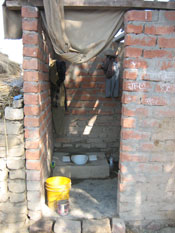On Tuesday 27 May, these two girls went missing, and were later found hanging by a mango tree. The reports confirm that they were raped and then choked to death. As much as this crime is about failed policies, village strongmen, caste based violence, and misplaced law and order in the village of Badaun, it is also a microcosm of the everyday vulnerability that young girls and women are exposed to when they have to go out in the dark or early morning to relieve themselves. This is further exacerbated by the caste politics involved in the reaction to the case (the girls were from a lower caste).
The Nirbhaya case (2012), where a young student paramedic was raped in a moving bus in Delhi, had drawn worldwide outrage. This also led to the tightening of anti-rape laws in India, sanctioning the death penalty for the perpetrators. Today, when we raise our voice against this horrific case of sexual violence in Badaun, we should also unequivocally raise our voice and demand for the human right to 'safe' sanitation in India.
Gender and sanitation
Sanitation is a global crisis. About 2.5 billion people lack access to adequate sanitation facilities all over the world. Nearly 1 billion people continue to defecate in the open and 82 percent of them live in ten countries, with India topping the list with the highest number of open defecators. In India, more than half a billion people lack access to sanitation in the country. In rural India, nearly 65 percent of the people defecate in the open (WHO-UNICEF 2014). Clearly, government policies on top-down management and initiatives such as, Total Sanitation Campaign have showed limited and scattered results as toilets are often used as storehouses or lack maintenance falling into disuse.
 |
| CLTS toilet, Indonesia by Lyla Mehta |
In recent years, grassroots initiatives such as Community Led Total Sanitation (CLTS) have concentrated on locally-developed solutions to build toilets and provide for low cost latrines, usually built by local populations sourcing local materials. By focusing on local mobilization, collective triggers and behavioural change, CLTS has emerged as a successful counter to the top down, subsidy centric approach. Pioneered by Dr Kamal Kar, it is now practised in over 60 countries worldwide and has also been mainstreamed in several national policies across Africa. (A STEPS Seminar in May 2014 provided an update into the progress of CLTS towards the aim of ending open defecation.)
Drawing on several case studies from India, Bangladesh and Indonesia, Lyla Mehta and Synne Movik's book Shit Matters (2011) also reiterates the point that infrastructure neither guarantees access nor equity. The sanitation needs of women differ widely from men but the top-down policies of 'giving toilets' obviate such differences. Having women on sanitation committees does not necessarily translate into factoring in their needs and demands. On the other hand, maintaining these toilets often becomes the responsibility of women. The gendered perception regarding the 'domestic' women ties them to exploitative burdens of fetching water and cleaning the toilets. This gender blindness and invisibility in policies linked to the top-down, supply driven momentum end up as layers over oppressive structures and practices.
Violence and safety
The reality is that women defecating in the open exposes them not only to risks of hygiene and health, but as the many reported and unreported cases show, they are subjected to violence of all sorts; stalking, teasing, lewd remarks, and rape being the final one. Lack of toilets or 'unsafe' toilets, i.e. toilets located in unguarded public places and dark alleys, prevent female mobility and lead to unhealthy practices of holding up. Women and girls gain dignity and privacy through proper sanitation and menstrual hygiene facilities. Lack of such facilities results in absenteeism from school, especially during menstruation (UN). These are indeed those everyday forms of violence, which are invisible in the homogenised policy solutions.
The roots of sexual violence run deep into patriarchy and its technologies of oppression. Toilets are, by no way, a panacea, but they are steps to mitigate and address those everyday forms of oppression and vulnerabilities. It's time we find more entry points into the mainstream policy issues that use and reinforce masculine perspectives and solutions to incisively gendered problems. Safe sanitation is but one step towards a future of safer health, hygiene and security for women.
Giving away toilets may do little by way of change unless women's perspectives are taken into account. We certainly need to factor in the voices of women about the suitability and location of toilet construction, and challenge the implicit assumptions about gender roles. This time, let’s not stop at the outcry against institutional apathy but push our claims for the right to demand sanitation rights and tackle gender violence squarely in all these very significant everyday sites.
By Shilpi Srivastava, DPhil Student, Institute of Development Studies

